Choose your language

Getting Around

Entry to Cuba: Visas & Travel Requirements
Traffic by the Capitol building, Havana
Photo: Shutterstock
Stay updated with the latest travel information for your trip to Cuba!
Embarking on a journey to Cuba? Here's your guide to the latest visa requirements and travel protocols. Whether you're coming from North America, Europe, or elsewhere, we've got you covered.
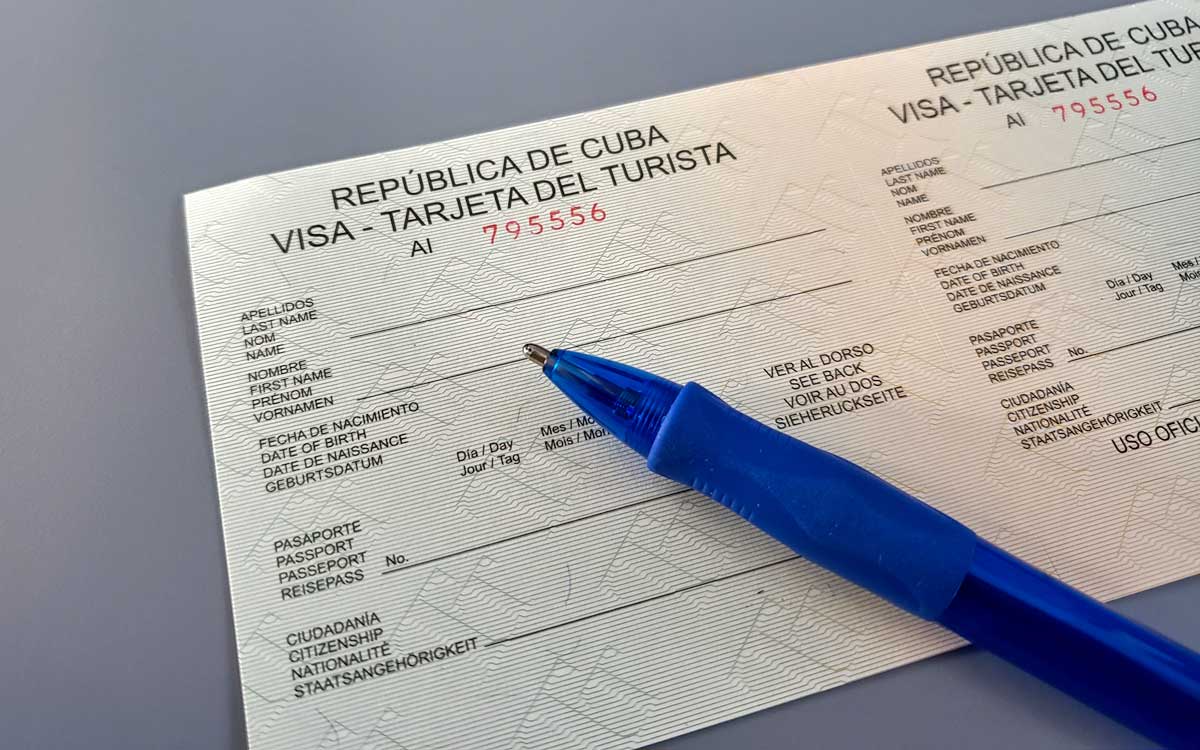
Cuba visa application form
What are the visa and entry requirements to Cuba?
US Citizens
Planning a trip to Cuba as a US citizen? There are special regulations you need to be aware of. While tourism trips to Cuba aren't yet authorized, general licenses have been issued for a variety of travel categories. If you meet the requirements of the general license under which they plan to travel, you won't need to apply for another permit from the OFAC (Office of Foreign Assets Control of the Treasury Department) for your trip.
However, it's important to note that the US Embassy in Havana and the State Department in Washington D.C do not process visa applications for trips to Cuba. If you need to apply for a visa or have any questions regarding your specific case, you should contact the Cuban Embassy in Washington D.C.
And remember, certain activities may not be allowed, so it's best to check with the US embassy for information on organizations or businesses in Cuba that U.S. citizens are not allowed to engage with due to economic sanctions or other legal restrictions.
Canadian Citizens
As a Canadian citizen, you'll need a valid passport for the duration of your stay in Cuba. Make sure your passport's expiration date isn't near to avoid any travel hiccups. Depending on your trip's purpose, you may need different types of visas. If you're traveling as a tourist, you'll need a tourist visa, which can be obtained from tour operators, airlines, or a Cuban government office in Canada.
European Citizens
If you're a European citizen planning to travel to Cuba, remember that visa protocols can vary depending on your country of residence. For most European citizens, a valid passport is required during your stay in Cuba. Some countries, like Spain, require the passport to be valid for at least 6 months.
It's also important to note that if you plan to travel to the United States after visiting Cuba, you'll need a visa. This is because the electronic system for travel authorization (ESTA) is not sufficient for those who have traveled to Cuba before. This visa must be obtained at the Consulate General of the US Embassy in your place of residence.
Given the varying requirements, it's a good idea to contact your tour operator or travel agency to understand the specific visa requirements for your travel.
Latin American Citizens
For Latin American citizens, a valid passport is required during your stay in Cuba. You'll also need to obtain a tourist visa or tourist card for your trip. This can be processed at tourism agencies or airlines, which usually handle its issuance.
The visa is generally issued for about 90 days and can then be extended. It's also important to note that you should have travel insurance with medical coverage.
Visa Costs: What to Expect
Visa costs can vary depending on where it's issued. Generally, prices range between $20 and $80. If you apply online, additional charges may apply, and prices can range from $110 to $150.
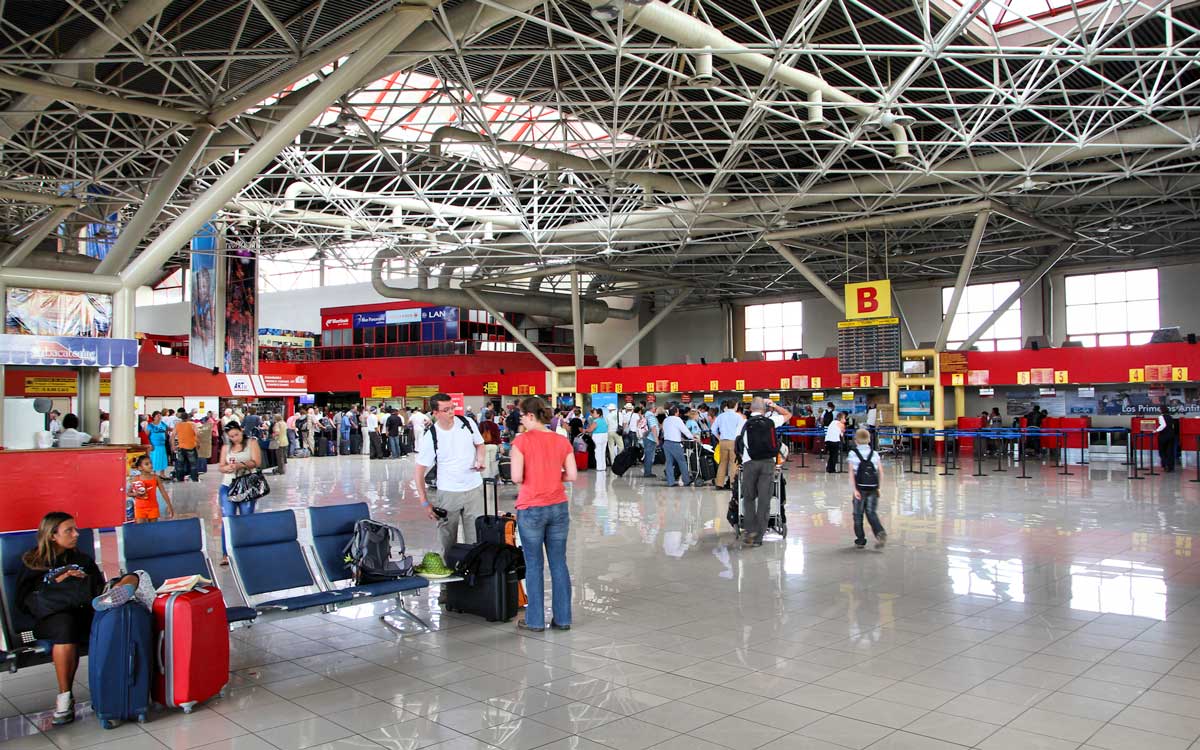
Jose Marti International Airport in Havana
What items can I bring to Cuba?
When packing for your trip to Cuba, you can bring personal effects, including personal phones and computers, free of charge. The range of objects you can bring to Cuba is quite wide, from musical instruments to televisions. However, some items may be subject to charges depending on Customs regulations.
Some items can be brought into the country without having to pay any import taxes. These include used personal objects, art and literature books, music discs, manufactured pharmaceutical products, and wheelchairs, among others.
However, it's crucial to be aware of prohibited items. While some of these, like explosives, drugs and narcotics, and blood derivatives, may seem obvious, others might surprise you. For instance, literature, articles or objects that are considered obscene, pornographic or that attack the general interests of the nation are also prohibited.
If you attempt to bring into the country articles that are not allowed for import, the General Customs of Cuba can exercise administrative sanctions. This means that Customs can seize those imported articles whose entry is prohibited in Cuba, as well as products that have been entered with a fraudulent declaration.
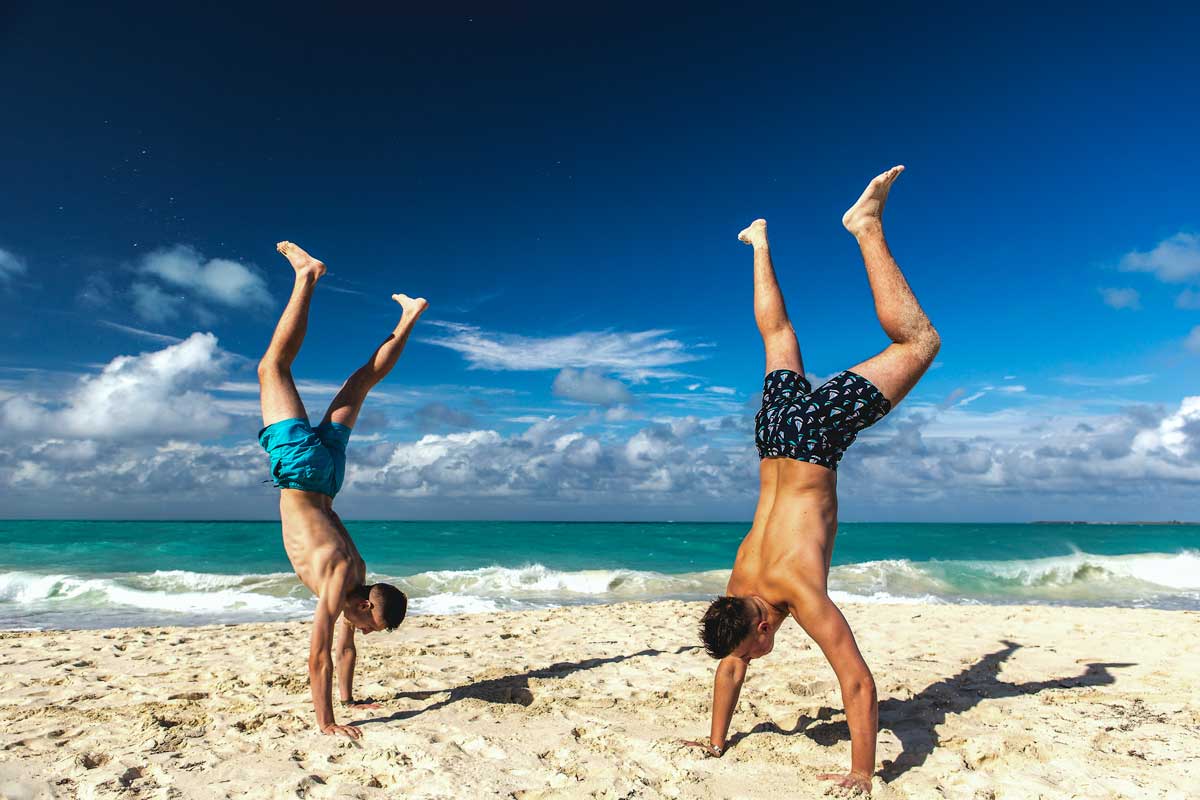
Travelers on a beach in Varadero
Photo: Unsplash
Health and Vaccinations
Before you embark on your journey to Cuba, it's important to ensure you're up to date with routine vaccines. This includes vaccines against chickenpox, tetanus, influenza, rubella, and polio. In the current climate, being vaccinated against COVID-19 is also essential.
Additionally, consider getting vaccinated against Hepatitis A and Hepatitis B. If your trip to Cuba includes exploring nature or venturing into rural areas away from the city center for activities such as outdoor camping, the rabies vaccine is also recommended. Travelers are also advised to consider the typhus vaccine.
Can I bring my pet to Cuba?
If you're planning to bring your pet to Cuba, there are a few requirements you need to meet. Make sure your pet has the necessary vaccines and an official health certificate. You'll also need to request a travel certificate for your pet from the Consulate or Embassy of Cuba in your country.
Written by Teresita Padrón .
Published July 2023.
Explore Top Destinations in Cuba
Is it safe to travel to cuba.
Planning to travel to Cuba this season? Here are some
Best Spots for Fishing Around Cuba
Largely untouched and diverse, Cuba is one of the most
LGBTQ+ Nightlife: Six Gay-Friendly Venues to Visit in Havana
Havana's LGBTQ+ scene is livelier than ever! Check out these
Sip and Dance Your Way Through Trinidad’s Nightlife
Things To DoSip and Dance Your Way Through Trinidad's Nightlife
Step Back in Time at Finca Vigía – Hemingway’s Home in Cuba
Visit the Ernest Hemingway home in Cuba that attracts followers
Top Four Jazz Clubs in Havana
Things to DoTop Four Jazz Clubs in Havana La Zorra
When Is the Best Time to Visit Cuba?
Planning a visit to Cuba? The island offers sunny skies
Six Cool Things to Do in Trinidad, Cuba
From colonial architecture to vibrant rumba beats, uncover the top
Five Cuban Clothing Brands to Shop for in Havana
Take a look at the emerging Cuban dress wear brands
Cuba’s Top Destinations For Your Next Mountain Bike Adventure
Get to know the 5 best spots for mountain biking
Subscribe to our newsletter
Get more travel inspiration, tips and exclusive offers sent straight to your inbox
I would like to get Visit Cuba newsletters in my inbox
Paradise for Your Inbox

Welcome to the Online Visa Application System of the Republic of Cuba.
Please, find the country where you are to fill out your application
Copyright © 2024. All rights reserved.
Designed By Zymphonies
Getting a visa to visit Cuba can be tricky, but it's worth it

Jan 18, 2024 • 4 min read
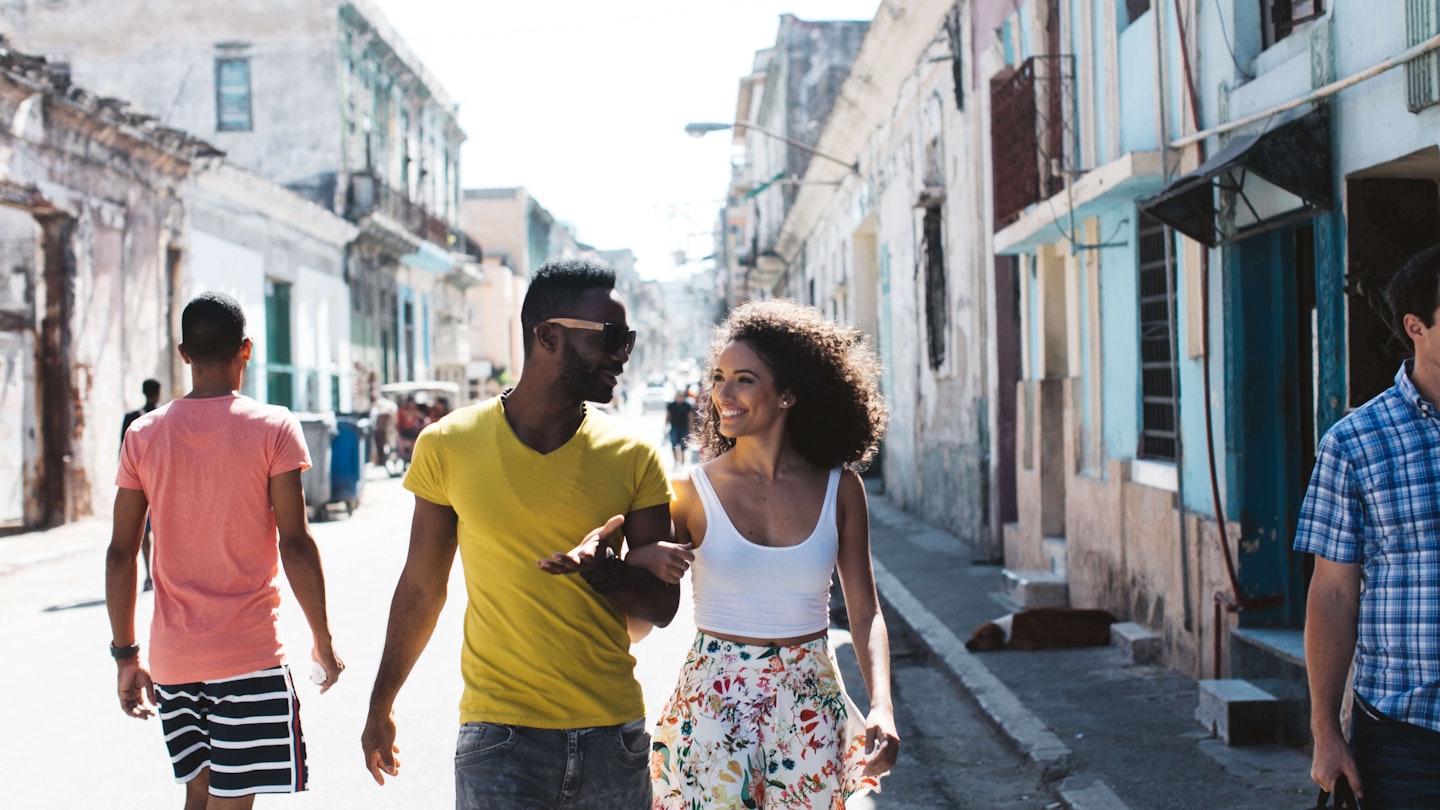
Apply early for a visa to Cuba unless you're one of the few nationalities that don't need one © Matt Porteous / Getty Images
Cuba is a Caribbean paradise, but because of the island’s tumultuous history and international relations, its visa rules can be complicated – especially for visitors from the US.
We've rounded up all the key information you need to know about Cuba ’s entry requirements, including details on the various types of visas, how to secure them and what they'll cost you.
Do I need a visa to visit Cuba?
Citizens of some Caribbean, Asian and European countries, including Russia, Montenegro, Serbia and Singapore, can travel visa-free to Cuba for up to 90 days with a passport that doesn’t expire for at least six months.
Passport holders from all other countries must purchase what is known officially as a Cuba Tourist Card, although it's often referred to as a Cuban visa.
You can get a Cuba Tourist Card one of three ways – pick it up yourself from the Cuban consulate in your home country, apply through the officially licensed third-party Visa Cuba , or have one included as part of a travel package purchased through a travel agency or airline.
You’ll need to provide your passport number, home address, the address of your booked accommodations in Cuba and information on your confirmed flights.
Depending on your country of origin, visa fees range from US$25 to US$85 – additional costs apply depending on who you purchase it from (in person at the consulate is the best way to avoid add-on handling fees).
If you apply by mail, you must send all needed documentation plus a self-addressed return envelope, so that the consulate can mail your visa card back to you.

How do I use my tourist card in Cuba?
As you depart Cuba at the end of your trip, you must present your Cuba Tourist Card to immigration authorities – make sure to store it in a safe place for the duration of your vacation. If you lose it during your stay on the island, you’ll have to wait a few hours for the authorities to clear you and issue a new document before you head back home.
The Cuba Tourist Card allows for a single-entry, 30-day stay in Cuba (90 days for Canadian citizens), but if you decide to stay longer, you can renew your visa for another 30 days at your hotel desk or at the nearest local immigration office.
Is it possible to re-enter the USA after I have been to Cuba?
Unfortunately, many non-US citizens have been caught out by the January 2021 change to the US ESTA (Electronic System for Travel Authorization) rules which now state that your ESTA is invalid if you have traveled to Cuba.
This doesn't mean you cannot go to Cuba via the USA and back, it just means you need to apply for a US visa from a US embassy or consulate.
For additional information about travel eligibility under the Visa Waiver Program, ie the ESTA, go to the US Customs and Border website .
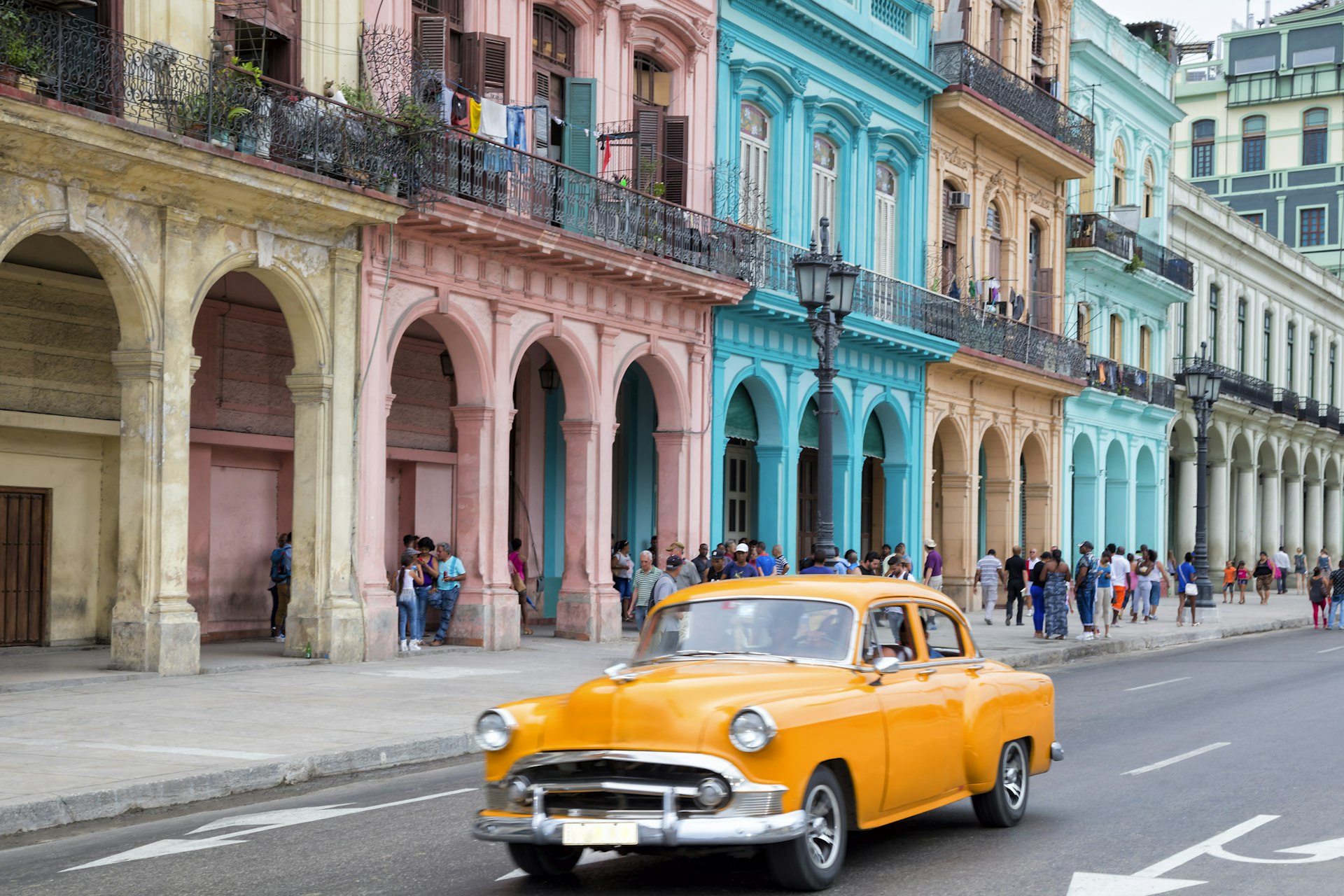
Can Americans visit Cuba?
The rules on Americans visiting seem to change with each new presidential administration. Yet the bottom line remains the same: Americans are allowed to visit Cuba, but traveling for tourism is not officially allowed.
The US Department of State issues licenses for 12 categories of travel , which include family visits, educational exchanges and humanitarian projects.
Independent American travelers might qualify to use the “support for the Cuban people” category; anyone who does this, however, must provide a detailed itinerary of the planned visit.
Additionally, US travelers are required to keep all travel receipts from Cuba for five years. While American citizens are forbidden from staying in Cuba’s government-run hotels , they can stay in casas particulares (private homestays).
If you’re a US citizen, you still need to purchase a Cuban Tourist Card – it's just a little different from the regular one (it’s pink in contrast to the green cards for other nationalities), as well as more expensive. Costs average around US$85 but we've seen up to US$110.
The final amount depends on the travel agency and its handling fees. Fees also apply depending on how you get the tourist card – in person at the Cuban consulate in Washington, DC, or by post.
You may be able to buy your tourist card directly from the airline you’re traveling to Cuba with. Contact them for the latest information.
It’s worth using an experienced US–Cuba travel organizer like Insight Cuba or Cuba Educational Travel – they'll be able to answer all your questions and help you navigate the bureaucracy.
This article was first published Mar 5, 2022 and updated Jan 18, 2024.
Explore related stories
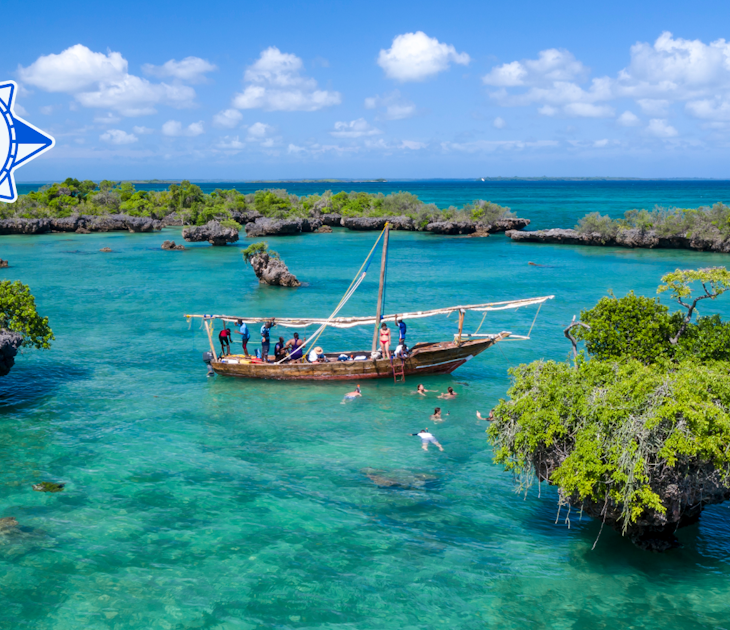
Tips & Advice
May 28, 2024 • 9 min read
From Aarhus to Zanzibar, plan your travels for July 2024 with these top places to visit.

Jan 9, 2024 • 4 min read
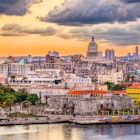
Jan 9, 2024 • 6 min read

Jan 6, 2024 • 7 min read
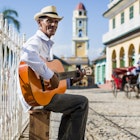
Jan 5, 2024 • 8 min read

Jan 5, 2024 • 4 min read

Jan 6, 2023 • 7 min read

Jan 5, 2023 • 8 min read

Nov 11, 2022 • 3 min read

Apr 28, 2022 • 6 min read
Security Alert May 17, 2024
Worldwide caution, update may 10, 2024, information for u.s. citizens in the middle east.
- Travel Advisories |
- Contact Us |
- MyTravelGov |
Find U.S. Embassies & Consulates
Travel.state.gov, congressional liaison, special issuance agency, u.s. passports, international travel, intercountry adoption, international parental child abduction, records and authentications, popular links, travel advisories, mytravelgov, stay connected, legal resources, legal information, info for u.s. law enforcement, replace or certify documents.
Before You Go

Learn About Your Destination
While Abroad
Emergencies
Share this page:
Travel Advisory July 26, 2023
Serbia - level 2: exercise increased caution.
Reissued with obsolete COVID-19 page links removed.
Exercise increased caution in Serbia due to crime .
Country Summary: Violence associated with organized crime and high-profile sporting events in Serbia is common.
Read the country information page for additional information on travel to Serbia.
If you decide to travel to Serbia:
- Be aware of your surroundings.
- Do not display signs of wealth, such as expensive watches or jewelry.
- Do not answer your door at your hotel/residence unless you know who it is.
- Stay alert in locations frequented by Westerners.
- Be extra vigilant when visiting banks or ATMs.
- Carry a copy of your passport and visa (if applicable) and leave the original in your hotel safe.
- Provide your itinerary to a family member or friend.
- Monitor local media.
- Enroll in the Smart Traveler Enrollment Program ( STEP ) to receive Alerts and make it easier to locate you in an emergency.
- Follow the Department of State on Facebook and Twitter .
- Review the Country Security Report for Serbia.
- Visit the CDC page for the latest Travel Health Information related to your travel.
- Prepare a contingency plan for emergency situations. Review the Traveler’s Checklist .
Embassy Messages
View Alerts and Messages Archive
Quick Facts
Must be valid at time of entry
One page required for entry stamp
Not required for stays under 90 days
No vaccines are required to enter Serbia.
None, if under 10,000 euros
Embassies and Consulates
U.s. embassy belgrade.
Bulevar kneza Aleksandra Karadordevica 92 11040 Belgrade Serbia Telephone: +(381) (11) 706-4000 Emergency After-Hours Telephone: +(381) (11) 706-4000 Fax: +(381) (11) 706-4481 Email: [email protected]
Destination Description
Learn about the U.S. relationship to countries around the world.
Entry, Exit and Visa Requirements
Visit the Embassy of Serbia's website for the most current visa information.
- U.S. citizens do not need a visa to enter and stay in Serbia for up to 90 days.
- It is important to enter and exit Serbia using the same passport. U.S. citizens who also hold Serbian citizenship should always enter and exit Serbia on their Serbian passport.
- If you lose your U.S. passport after arriving in Serbia, you must obtain a police report and a new passport prior to departure.
- You cannot enter Serbia using an expired passport or one that has previously been reported lost or stolen. Immigration authorities will deny you entry and return you to the city from which you flew to Serbia.
- U.S. citizens must register with the local police within 24 hours of arrival. Hotels or similar accommodation will do this for you. If you are staying at a private residence, you will need to register in person at the nearest police station.
HIV/AIDS Restrictions: The U.S. Department of State is unaware of any HIV/AIDS entry restrictions for visitors to or foreign residents of Serbia.
Temporary Residence Permits: If you wish to stay in Serbia longer than 90 days during any 180-day period, you must apply for a temporary residence permit from the local police with jurisdiction over where you are staying in Serbia. You cannot apply for a residence permit from outside of Serbia.
- For information about how to apply for a temporary residency permit, please visit the Serbian Ministry of Interior’s website .
- All application documents submitted for temporary residence will require an ‘apostille’ stamp from the government office where you got the document. To learn more about apostilles and other official documents, please see the Office of Authentications page .
Special Guidance for Travel to and from Kosovo:
- Serbian border officials do not recognize the authority of Kosovo’s government.
- Serbia will not grant entry to travelers who try to enter Serbia from Kosovo without first having previously entered Serbia from another recognized entry point and obtaining a Serbian entry stamp.
- Example: A traveler who arrives in Serbia by air and drives directly to Kosovo (not through a third country) will be permitted to re-enter Serbia directly from Kosovo.
- Example: A traveler who arrives in Kosovo by land or air from a third country (not Serbia) and then plans to travel by land to Serbia must first exit Kosovo via its border with either Montenegro or North Macedonia and then proceed to a border crossing with Serbia.
Find information on dual nationality , prevention of international child abduction and customs regulations on our websites.
Safety and Security
Terrorism: Terrorist groups and those inspired by such organizations are intent on attacking U.S. citizens abroad. Terrorists worldwide are increasingly using less sophisticated methods of attack – including knives, firearms, rudimentary Improvised Explosive Devices (IEDs) and vehicles – to more effectively target crowds. Frequently, they target unprotected or vulnerable venues, such as:
- High-profile public events (sporting contests, political rallies, demonstrations, holiday events, celebratory gatherings, etc.)
- Hotels, clubs, and restaurants frequented by tourists
- Places of worship
- Shopping malls and markets
- Public transportation systems (including subways, buses, trains, and scheduled commercial flights)
For more information, see our Terrorism page.
Anti-U.S. Sentiments: While Serbians can be welcoming to visitors, anti-U.S. sentiment is widespread and can be more prevalent around certain anniversaries and some national holidays, including: February 17 (anniversary of Kosovo’s 2008 declaration of independence), between March 24 and June 10 (the anniversary of the 1999 NATO air campaign against Yugoslavia in response to events in Kosovo), and potentially June 28 (St. Vitus’s Day or Vidovdan).
Sporting Events: There is the potential for violence before, during, and after sporting events. There have been clashes between police and fans in the vicinity of sports venues, which are often located in residential areas. The Embassy considers matches between certain teams, including Partizan, Rad, and Red Star, to be high risk events because of violence at previous games. While U.S. citizens have not been targeted in the past, in a few isolated cases non-Serbians have been the victims of sports-related violence. U.S. Government employees are generally advised to avoid the vicinity of high-profile sporting events.
Night Clubs: As a safety precaution due to xenophobic violence, the following clubs have been declared off-limits for U.S. Embassy personnel in Serbia:
- Klub Šlep (Shlep)
- Mr. Stefan Braun
Crime:
- Violent crime in Serbia is most often associated with organized crime activities and hooliganism surrounding high-profile sporting events.
- Although not traditionally the targets of violent crime, tourists and visitors should maintain a heightened awareness of their surroundings, as in all major cities.
- Pickpocketing and financial crimes of opportunity are the most common occurrences.
- Tourists should pay attention to taxi meters and listed fares as some taxi drivers may try to scam foreigners and charge higher rates.
Demonstrations occur frequently. They may take place in response to political or economic issues, on politically significant holidays, and during international events.
- Demonstrations can be unpredictable, avoid areas around protests and demonstrations.
- Past demonstrations have turned violent. Check local media for updates and traffic advisories.
- Maintain caution if within the vicinity of demonstrations.
- There is often a heavier than usual police presence near demonstrations and traffic may slow or stop until well after the demonstration ends.
International Financial Scams: See the Department of State and the FBI pages for information on scams.
Victims of Crime: If you or someone you know becomes the victim of a crime in Serbia, you should contact the local police. Report crimes first to the local police by dialing 192. Remember local authorities are responsible for investigating and prosecuting crimes. Not all police officers speak English.
See our webpage on help for U.S. victims of crime overseas .
- Help you find appropriate medical care
- Assist you in reporting a crime to the police
- Contact relatives or friends with your written consent
- Explain the local criminal justice process in general terms
- Provide a list of local attorneys
- Provide our information on victim’s compensation programs in the United States
- Provide an emergency loan for repatriation to the United States and/or limited medical support in cases of destitution
- Help you find accommodation and arrange flights home
- Replace a stolen or lost passport
Domestic Violence: U.S.-citizen victims of domestic violence may contact the Embassy for assistance.
Tourism: The tourism industry is unevenly regulated, and safety inspections for equipment and facilities do not commonly occur. Hazardous areas/activities are not always identified with appropriate signage, and staff may not be trained or certified either by the Serbian government or by recognized authorities in the field. In the event of an injury, appropriate medical treatment is typically available only in/near major cities. First responders are generally unable to access areas outside of major cities and to provide urgent medical treatment. U.S. citizens are encouraged to purchase medical evacuation insurance. See our webpage for more information on insurance providers for overseas coverage
Local Laws & Special Circumstances
Criminal Penalties: You are subject to local laws. If you violate local laws, even unknowingly, you may be expelled, arrested, or imprisoned. Individuals establishing a business or practicing a profession that requires additional permits or licensing should seek information from the competent local authorities, prior to practicing or operating a business.
Furthermore, some crimes are also prosecutable in the United States, regardless of local law. For examples, see our website on crimes against minors abroad and the Department of Justice website.
Arrest Notification : If you are arrested or detained, ask police or prison officials to notify the U.S. Embassy immediately. See our webpage for further information.
Counterfeit and Pirated Goods: Although counterfeit and pirated goods are prevalent in many countries, they may still be illegal according to local laws. You may also pay fines or have to give them up if you bring them back to the United States. See the U.S. Department of Justice website for more information.
Faith-Based Travelers: See our following webpages for details:
- Faith-Based Travel Information
- International Religious Freedom Report – see country reports
- Human Rights Report – see country reports
- Best Practices for Volunteering Abroad
LGBTQI+ Travelers: There are no legal restrictions on same-sex sexual relations in Serbia or on the organization of LGBTQI+ events. Serbia has active and increasingly-visible LGBTQI+ advocacy groups, and several LGBTQI+ bars operate openly and without problems in Belgrade. Many recent LGBTQI+ public eventshave been held without incident. However, LGBTQI+ travelers should exercise caution when visiting Serbia. Many LGBTQI+ persons in Serbia choose not to openly reveal their sexual orientation or show public displays of affection due to security and safety concerns, and many avoid reporting incidents to police. Similarly, many transgender and gender non-conforming persons often find themselves targets of discrimination and violence and therefore may make the choice to hide or modify their identities when in public spaces. Though a growing number of police officers have received training on how to work with LGBTQI+ individuals, including when they are victims of crime, many have limited experience and knowledge.
For further general information on travel abroad by LGBTI individuals, please read our LGBTI Travel Information page.
Travelers with Disabilities: The law in Serbia prohibits discrimination against persons with physical, sensory, intellectual or mental disabilities, and the law is enforced. Social acceptance of persons with disabilities in public is not as prevalent as in the United States. The most common types of accessibility may include accessible facilities, information, and communication. Expect accessibility to be limited in lodging, and general infrastructure, and common in public transportation.While there is some accessibility for travelers with disabilities in Belgrade and Novi Sad, there are limited to no accessibility in the rest of Serbia.
- Rental of aids/equipment/devices is available: There several companies that sell, rent and repair aids/equipment/devices. Among the most known ones are Centar Eliksir and Ortopedija mc .
Students: See our Students Abroad page and FBI travel tips .
Women Travelers: See our travel tips for women travelers .
Bringing Money into Serbia: If you enter Serbia with more than 10,000 euro in cash (or equivalent in other currencies), you must declare it to customs. If you fail to do so, Serbian customs may confiscate your money or levy heavy fines. Please review our customs information for additional details.
Medical Facilities: Many doctors and other health care providers in Serbia are highly trained. Equipment and hygiene in hospitals, clinics, and ambulances are usually not up to U.S. standards. U.S. name-brand medicines are often unavailable in Serbia. You can get many medicines and basic medical supplies at private pharmacies. Medical facilities require payment in cash for all services, and do not accept U.S. health insurance. Please review our travel tips for older travelers .
For emergency services in Serbia, dial 193 (fire-fighters), 194 (paramedics), or 987 (roadside assistance).
Ambulance services are not widely available, and training, availability of emergency responders, and ambulance equipment may be below U.S. standards.
We do not pay medical bills. Be aware that U.S. Medicare/Medicaid does not apply overseas. Hospitals and doctors overseas do not accept U.S. health insurance.
Medical Insurance: Make sure your health insurance plan provides coverage overseas. Most care providers overseas only accept cash payments. See our webpage for more information on insurance providers for overseas coverage. Visit the U.S. Centers for Disease Control and Prevention for more information on type of insurance you should consider before you travel overseas.
We strongly recommend supplemental insurance to cover medical evacuation.
Medications: Always carry your prescription medication in original packaging, along with your doctor’s prescription. Check with the Medicines and Medical Devices Agency to ensure the medication is legal in Serbia.
Vaccinations: Be up-to-date on all vaccinations recommended by the U.S. Centers for Disease Control and Prevention.
Further health information:
- World Health Organization
- U.S. Centers for Disease Control and Prevention (CDC)
Air Quality: Visit AirNow Department of State for information on air quality at U.S. Embassies and Consulates.
The U.S. Embassy maintains a list of doctors and hospitals . We do not endorse or recommend any specific medical provider or clinic.
Health facilities in general:
- Adequate health facilities are available throughout the country but health care in rural areas may be below U.S. standards.
- Some private hospitals may require advance payment or proof of adequate insurance before admitting a patient.
- Psychological and psychiatric services are limited, even in the larger cities, with hospital-based care only available through government institutions
Medical Tourism and Elective Surgery
- Medical tourism is a rapidly growing industry, especially in dentistry. People seeking health care overseas should understand that medical systems operate differently from those in the United States and are not subject to the same rules and regulations. Anyone interested in traveling for medical purposes should consult with their local physician before traveling and visit the U.S. Centers for Disease Control and Prevention website for more information on Medical Tourism.
- We strongly recommend supplemental insurance to cover medical evacuation in the event of unforeseen medical complications.
- In case of malpractice, you may pursue legal remedies using local attorneys.
Pharmaceuticals
- U.S. Customs and Border Protection and the Food and Drug Administration are responsible for rules governing the transport of medication back to the United States. Medication purchased abroad must meet their requirements to be legally brought back into the United States. Medication should be for personal use and must be approved for usage in the United States. Please visit the U.S. Customs and Border Protection and the Food and Drug Administration websites for more information.
Non-Traditional Medicine
- U.S. citizens have suffered serious complications or died while seeking medical care from non-traditional “healers” and practitioners in Serbia. Homeopathy, herbal remedies, and other non-traditional treatments are practiced in Serbia and promoted as natural alternatives to traditional medicine. Ensure you have access to licensed emergency medical facilities in such cases.
Assisted Reproductive Technology and Surrogacy
- If you are considering traveling to Serbia to have a child through use of assisted reproductive technology (ART) or surrogacy, please see our ART and Surrogacy Abroad page .
- Surrogacy is illegal for foreigners and Serbians in Serbia.
Adventure Travel
- Visit the U.S. Centers for Disease Control and Prevention website for more information about Adventure Travel.
Travel and Transportation
Road Conditions and Safety: Roads in Serbia are not always well-maintained, especially in rural areas and in southern Serbia.
- Exercise caution when driving on roads in southern Serbia in the winter.
- Drivers should also be cautious when driving along Serbia’s Ibarska Magistrala, the highway between Belgrade and Čačak, because of the higher rate of accidents.
- Winter fog in Serbia is another concern because it significantly reduces visibility and is especially heavy in the Vojvodina region between Belgrade and the Hungarian border.
Roadside assistance is available by dialing 987 locally. The local numbers for the police and ambulance are 192 and 194, respectively.
Traffic Laws:
- You may use a U.S. driver’s license together with an international driving permit in Serbia for up to six months, after which time you may have to obtain a Serbian driver’s license.
- Drivers with a blood alcohol level higher than 0.02% are considered intoxicated and face arrest, prosecution, and fines.
- You must wear a seat belt while driving or riding in a car in Serbia.
- You may not use a mobile phone while driving in Serbia except with a hands-free system.
Public Transportation: Belgrade and some other large cities in Serbia have public transportation networks. Buses are often crowded, and some lines and vehicles are poorly maintained. There is also intercity bus and train service for many locations in Serbia.
See our Road Safety page for more information. More specific information concerning Serbian driving permits, vehicle inspection, road tax, and required insurance is available at the Serbian Automotive Association's website .
Aviation Safety Oversight: The U.S. Federal Aviation Administration (FAA) has assessed the government of Serbia’s Civil Aviation Authority as being in compliance with International Civil Aviation Organization (ICAO) aviation safety standards for oversight of Serbia’s air carrier operations. Further information may be found on the FAA’s safety assessment page .
For additional travel information
- Enroll in the Smart Traveler Enrollment Program (STEP) to receive security messages and make it easier to locate you in an emergency.
- Call us in Washington, D.C. at 1-888-407-4747 (toll-free in the United States and Canada) or 1-202-501-4444 (from all other countries) from 8:00 a.m. to 8:00 p.m., Eastern Standard Time, Monday through Friday (except U.S. federal holidays).
- See the State Department’s travel website for the Worldwide Caution and Travel Advisories .
- Follow us on Twitter and Facebook .
- See traveling safely abroad for useful travel tips.
Review information about International Parental Child Abduction in Serbia . For additional IPCA-related information, please see the International Child Abduction Prevention and Return Act ( ICAPRA ) report.
Travel Advisory Levels
Assistance for u.s. citizens, learn about your destination, enroll in step.

Subscribe to get up-to-date safety and security information and help us reach you in an emergency abroad.
Recommended Web Browsers: Microsoft Edge or Google Chrome.
Make two copies of all of your travel documents in case of emergency, and leave one with a trusted friend or relative.
Afghanistan
Antigua and Barbuda
Bonaire, Sint Eustatius, and Saba
Bosnia and Herzegovina
British Virgin Islands
Burkina Faso
Burma (Myanmar)
Cayman Islands
Central African Republic
Cote d Ivoire
Curaçao
Czech Republic
Democratic Republic of the Congo
Dominican Republic
El Salvador
Equatorial Guinea
Eswatini (Swaziland)
Falkland Islands
France (includes Monaco)
French Guiana
French Polynesia
French West Indies
Guadeloupe, Martinique, Saint Martin, and Saint Barthélemy (French West Indies)
Guinea-Bissau
Isle of Man
Israel, The West Bank and Gaza
Liechtenstein
Marshall Islands
Netherlands
New Caledonia
New Zealand
North Korea (Democratic People's Republic of Korea)
Papua New Guinea
Philippines
Republic of North Macedonia
Republic of the Congo
Saint Kitts and Nevis
Saint Lucia
Saint Vincent and the Grenadines
Sao Tome and Principe
Saudi Arabia
Sierra Leone
Sint Maarten
Solomon Islands
South Africa
South Korea
South Sudan
Switzerland
The Bahamas
Timor-Leste
Trinidad and Tobago
Turkmenistan
Turks and Caicos Islands
United Arab Emirates
United Kingdom
Vatican City (Holy See)
External Link
You are about to leave travel.state.gov for an external website that is not maintained by the U.S. Department of State.
Links to external websites are provided as a convenience and should not be construed as an endorsement by the U.S. Department of State of the views or products contained therein. If you wish to remain on travel.state.gov, click the "cancel" message.
You are about to visit:
We’re sorry, this site is currently experiencing technical difficulties. Please try again in a few moments. Exception: request blocked

Cuba Visa Travel Requirements

Cuba travel requirements
If you’re planning a trip to Cuba, it’s important to know the travel requirements before you go. Here’s a comprehensive guide to help you prepare for your journey:
COVID-19 Requirements
- Visa Requirements
- Health Insurance
Culture and Etiquette
You do not need to show a COVID vaccination certificate or negative COVID test to enter Cuba.
Health officials may screen you for COVID symptoms on arrival. They may also randomly select travellers for rapid antigen testing.
Visa requirements
Passport validity.
If you are visiting Cuba, your passport should be valid for 6 months from the date you arrive.
All travellers are required to complete a Health Declaration (Declaracíon Jurada de Sanidad) online before travel to be submitted to the Health authorities on arrival at the port of entry.
Check with your travel provider to make sure your passport and other travel documents meet their requirements.
Most foreign passport holders need a tourist or business visa to enter Cuba. Cuba has introduced an ‘e-visas’ system through which applications can be submitted and approved online in advance of travel.
Visa-Exempt Countries:
Citizens of the following 20 countries can visit Cuba without a visa, for up to the duration listed below:
Indefinite stay
90 days within any 180 days
90 days within any 1 calendar year
Health insurance
Health insurance is a critical consideration when traveling to Cuba. It’s important to have comprehensive coverage that will cover any medical expenses you may incur while abroad. Cuban healthcare facilities may vary in quality, and private hospitals can be expensive, especially for foreign visitors. In case of an emergency, having reliable health insurance can prevent you from being stuck with a hefty medical bill or being denied treatment due to lack of funds.
In addition, the risk of getting sick or experiencing an accident while traveling is always present, and having valid health insurance is the best way to ensure that you receive adequate medical care. Traveling without health insurance is not worth the risk, as it can lead to unexpected financial hardships during an already stressful situation.
In Cuba, serious medical conditions may require medical evacuation to other countries, such as the United States or Canada, which can be incredibly costly. With dependable health insurance, visitors can have peace of mind knowing that they can access the necessary medical treatment they need without any significant financial strain. So, if you plan to visit Cuba, make sure to purchase comprehensive health insurance before you go to enjoy your trip safely and without any unexpected expenses.
Cuba’s currency is the Cuban Peso (CUP) and the Cuban Convertible Peso (CUC). The CUC is pegged to the US Dollar, so it’s widely accepted throughout the country, especially in tourist areas. You can exchange your foreign currency for CUC at banks, exchange bureaus, and authorized Forex dealers. Be aware that the Cuban government charges a 10% fee for exchanging US Dollars, so it may be more cost-effective to bring Euros, Canadian Dollars, or British Pounds.
Credit cards are accepted at some hotels, restaurants, and shops in Cuba, but it’s best to carry cash as a backup. Most businesses in Cuba only accept cash, and ATMs are not always reliable or easy to find, so it’s important to plan accordingly. Be sure to notify your bank that you will be traveling to Cuba before your trip to ensure uninterrupted access to your funds while abroad.
It’s also worth noting that there are two different currencies in circulation in Cuba, with the Cuban Peso (CUP) primarily used by locals for everyday transactions, and the Cuban Convertible Peso (CUC) used by tourists for larger purchases and in tourist areas. Visitors to Cuba should be aware of the differences between the two currencies to avoid any confusion or misunderstandings while shopping or dining out.
Cuba is a country rich in history and culture, and it’s essential to be respectful of local customs and traditions. Cubans are generally warm and friendly people who value hospitality and appreciate visitors who show an interest in their culture. When interacting with locals, it’s important to greet them appropriately. Handshakes are the most common form of greeting in Cuba, and it’s customary to use the right hand when shaking hands or passing something to someone.
In Cuba, modest clothing is generally appreciated, particularly when visiting religious sites or rural areas. It’s also important to dress appropriately when visiting government buildings or other official places. Public displays of affection between couples are common, but it’s advised to be respectful and considerate of local customs.
When visiting someone’s home, it’s customary to bring a small gift, such as flowers or a box of chocolates. It’s also important to remove your shoes before entering, as this is a sign of respect. When dining with locals, it’s customary to wait until the host invites you to start eating, and it’s important to try everything that is offered as a sign of appreciation for the host’s hospitality.
Overall, being respectful of local customs and practicing a few basic cultural norms will go a long way towards fostering good relationships between travelers and Cubans. By being mindful of local traditions and etiquette, visitors can gain a deeper appreciation for Cuban culture and have a more fulfilling experience while exploring this fascinating country.
eVisa details
Maximum visit: 7 / 90 days; up to 1 year Multiple entries: optional Processing: in 72 hours Requires: Passport, Return flight ticket
Cuba. Breathtaking.

Cuba-evisit.org is a comprehensive tourism portal and advisor for Cuba, designed to provide travelers with all the information they need to plan a perfect trip to the country. The website offers a wealth of information on Cuba’s culture, history, attractions, and activities, as well as practical tips on visa requirements, transportation, and accommodations. Cuba-evisit.org is dedicated to promoting tourism in Cuba and showcasing the best the country has to offer. With expert advice and insider tips, Cuba-evisit.org is the ultimate guide for anyone planning to visit Cuba.
Disclaimer: Cuba-evisit.org is an independent travel advisor and is not affiliated with or endorsed by any government agency or organization. We provide travel assistance services to individuals who are planning to travel to Cuba. Our services are designed to help travelers navigate the complex travel requirements and procedures, and our team of experienced professionals provides personalized support to ensure that travelers have a seamless and hassle-free travel experience. Please note that Cuba-evisit.org is not a substitute for official government resources or processes, and we strongly advise travelers to refer to the relevant government websites and resources for the most up-to-date and accurate information.
Welcome to eServices
Here you can use electronic services of diplomatic and consular offices and other competent authorities of the Republic of Serbia.
All eServices in one place
For foreign citizens.
Apply for visa C, visa D or temporary residence approval in Republic of Serbia.
List of available services will be presented after you login.
For companies in Republic of Serbia
Apply if you wish to employe one or more foreign citizens.
eServices available for companies are group visa D and group temporary residence,
and unified permit for temporary residence and work.
To access eServices register on eGovernment Portal.
Did you find the service you are looking for?
Learn more about the visa regime. Find more information, instructions and documentation needed on Entry & Stay Regulations.
If you have additional questions about the visa regime, permits and electronic services, please contact us:
We’re sorry, this site is currently experiencing technical difficulties. Please try again in a few moments. Exception: request blocked
We’re sorry, this site is currently experiencing technical difficulties. Please try again in a few moments. Exception: request blocked
We’re sorry, this site is currently experiencing technical difficulties. Please try again in a few moments. Exception: request blocked
We’re sorry, this site is currently experiencing technical difficulties. Please try again in a few moments. Exception: request blocked
We’re sorry, this site is currently experiencing technical difficulties. Please try again in a few moments. Exception: request blocked
We’re sorry, this site is currently experiencing technical difficulties. Please try again in a few moments. Exception: request blocked

IMAGES
VIDEO
COMMENTS
For holders of diplomatic and official passports: Visas required. For holders of ordinary passports: Visas required. Citizens of the Republic of Cuba, who have not been granted temporary residence or permanent residence in the Republic of Serbia, and/or who have not previously been issued a D visa (long-term visa), when entering the Republic of Serbia, in addition to meeting the general entry ...
Travel to Serbia: Before travelling to the Republic of Serbia, please read here general entry requirements. Citizens of the Republic of Cuba traveling to the Republic of Serbia do not need visas (up to 90 days). All holders of Cuban travel documents for aliens or refugees require an entry visa for the Republic of Serbia.
Do Serbian citizens need a visa for Cuba? Serbian citizens do not need a tourist visa when travelling to Cuba in 2024. Serbian passport holders can stay in Cuba for a short period of time (for 90 days). Please, read all the information below to make your trip easy and safe.
The Free Visa Agreement is in force between the Republic of Serbia and the Republic of Cuba, according to which citizens of both countries can travel and stay in the other without a visa, up to 90 days, as tourists.
By following these 4 steps, Serbia citizens can ensure a smooth and hassle-free process in obtaining an Cuba tourist visa. 1. Valid passport. Check country passport is valid with at least 6 months of validity beyond their intended stay in destination. If not apply for a new country passport.
For most European citizens, a valid passport is required during your stay in Cuba. Some countries, like Spain, require the passport to be valid for at least 6 months. It's also important to note that if you plan to travel to the United States after visiting Cuba, you'll need a visa. This is because the electronic system for travel authorization ...
Welcome to the Online Visa Application System of the Republic of Cuba. Please, find the country where you are to fill out your application. Country where you are. Algeria. Angola. Antigua and Barbuda. Argentina. Australia. Austria. Azerbaiyán. Bahamas. Barbados. Belarús. Bélgica.
Welcome to Serbia. This web portal is an official platform administered by the Government of the Republic of Serbia 1. Here you can find all the information about immigration to Serbia. 1 pursuant to Article 3, Paragraph 1, Point 3c of the Law on Foreigners ("Official Gazette of RS" no. 24/18, 31/19 and 62/23)
Citizens of some Caribbean, Asian and European countries, including Russia, Montenegro, Serbia and Singapore, can travel visa-free to Cuba for up to 90 days with a passport that doesn't expire for at least six months. Passport holders from all other countries must purchase what is known officially as a Cuba Tourist Card, although it's often ...
Cuban citizens must obtain a visa before travelling to Serbia. Serbia Tourist visa is required for Cuban citizens. With this tourist visa stay is usually short with a period of 90 days. Applicant is required to be present when applying for Serbia tourist visa. A total of 8 documents are required for applying Serbia tourist visa. You can find Serbia visa exemptions.
Call us in Washington, D.C. at 1-888-407-4747 (toll-free in the United States and Canada) or 1-202-501-4444 (from all other countries) from 8:00 a.m. to 8:00 p.m., Eastern Standard Time, Monday through Friday (except U.S. federal holidays). See the State Department's travel website for the Worldwide Caution and Travel Advisories.
Serbia is introducing new visa requirements. Serbia's visa-free travel policy with countries such as India, Cuba, Tunisia and Burundi has made Belgrade Airport an alternative entry point for ...
Individuals who meet the regulatory conditions of the general license they seek to travel under do not need to apply for an additional license from OFAC to travel to Cuba. The 12 categories of authorized travel to Cuba are: family visits; official business of the U.S. government, foreign governments, and certain intergovernmental organizations ...
Do Cuban citizens need a visa for Serbia? Cuban citizens must obtain a visa before entry into Serbia. Reach Serbia embassy or consulate for the instructions how to apply the visa. Updated: 04/16/2024.
Visitors to Cuba must obtain a visa before travel or a tourist card from one of the Cuban diplomatic ... Yugoslavia - as per note from 19 April 2010, it applies to North Macedonia, Montenegro and Serbia. 10 December 1981: Benin; 19 January 1994: Namibia; 29 July 1994: Russia; 19 February 1996: Barbados; 8 July 1997: Saint Vincent and the ...
Check with your travel provider to make sure your passport and other travel documents meet their requirements. Visas. Most foreign passport holders need a tourist or business visa to enter Cuba. Cuba has introduced an 'e-visas' system through which applications can be submitted and approved online in advance of travel.
For companies in Republic of Serbia. Apply if you wish to employe one or more foreign citizens. eServices available for companies are group visa D and group temporary residence, and unified permit for temporary residence and work. To access eServices register on eGovernment Portal.
The decision had been confirmed by an official of the Serbian Embassy in Havana to Cuban newspaper Diario De Cuba back in March, SchengenNews reports. According to Cuban lawyer and activist residing in Belgrade, Fernando Almeyda, in early March, Serbia had already started preparing for the re-imposing of visas for Cubans as " the necessary ...
Serbian passport. Visa requirements for Serbian citizens are administrative entry restrictions by the authorities of other states placed on citizens of the Republic of Serbia.. As of 2024, Serbian citizens had visa-free or visa on arrival access to 139 countries and territories, ranking the Serbian passport 36th in the world according to the Henley Passport Index.
Upon arrival in Serbia, present of Cuba passport, and other required travel documents to the immigration officer and pay any visa fee required. 4. ... When Serbia transit visa is available, documents required for Serbia transit visa process from Cuba include passport, a completed visa application form and other supporting documents. ...
The embassy of Cuba in Belgrade is located at Domentijanova 4 and can be contacted by telephone on 11 369 2441 and 11 3692-689 and by email [email protected] and [email protected].
Review your travel plans to adjust for possible delays and disruptions. Contact your airline or travel company for assistance. Monitor local media for updates. Exercise caution if unexpectedly in the vicinity of large gatherings or crowds. Register in STEP to receive alerts and messaging from the U.S. Embassy in Lima.
Assistance: U.S. Embassy in Beirut - Lebanon. Awkar - Facing the Municipality. Main Street Beirut, Lebanon. 961-4- 543 600. [email protected]. State Department - Consular Affairs. 1-833-890-9595 (toll free) and 606-641-0131 (local) Enroll in Smart Traveler Enrollment Program (STEP) to receive security updates.
March 21, 2024 - The United States and Lao PDR co-chaired the 2024 Mekong-U.S. Partnership (MUSP) Policy Dialogue in Ho Chi Minh City, Vietnam, March 20-21. The two-day event convened Director and Deputy Director General officials responsible for issues relevant to the collective Mekong sub-region from the six MUSP member countries of Cambodia, Lao PDR, Myanmar, Thailand, Vietnam, and the ...
The U.S. Embassy in the Philippines provides all routine visa services. For some classes of visas, wait times are substantial. The Embassy continues to prioritize travelers with urgent needs and certain critical categories of visas. Immigrant Visa (IV): We are processing immigrant visas across all categories. However, with significant backlogs ...
Contact Us. For all immigrant visa-related inquiries, please start with our Islamabad Immigrant Visa Navigator. For all non-immigrant visa-related inquiries, please start with our Nonimmigrant Visa Navigator. Also, you may email us at: [email protected]. Or call us at: Pakistan: 021-111-234-111. United States: (703) 988-3426.
The State Department advises U.S. citizens overseas to exercise increased caution because of increased tensions around the world and the potential for terrorist attacks, demonstrations, or violent actions against U.S. citizens and interests.
Secretary of State Antony J. Blinken will travel to Egypt, Israel, Jordan, and Qatar from June 10-12, 2024. The Secretary will discuss with partners the need to reach a ceasefire agreement that secures the release of all hostages. He will emphasize the importance of Hamas accepting the proposal on the table, which is nearly identical to one Hamas endorsed last month. The Secretary […]